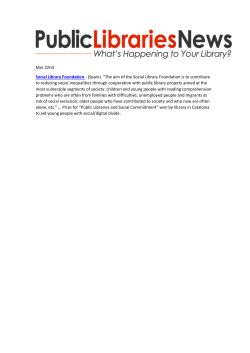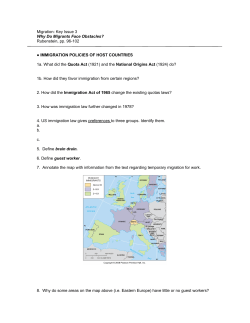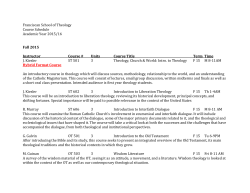
[PT 12.6 (2011) 807-812] Political Theology (print) ISSN 1462
[PT 12.6 (2011) 807-812] doi:10.1558/poth.v12i6.807 Political Theology (print) ISSN 1462-317X Political Theology (online) ISSN 1473-1719 Editorial Migration as a Challenge for Theological Ethics David Hollenbach, SJ1 University Chair in Human Rights and International Justice Theology Department, Boston College Chestnut Hill, MA 02467 USA hollenb@bc.edu The movement of massive numbers of people across national borders is one of the defining characteristics of the world today. In 2010 over 214 million people were living outside of the country in which they had been born. More than half of these people had migrated to the high income countries of North America and Europe. Most moved voluntarily in pursuit of a better life for themselves and their children. But a remarkably large number were driven from their homes involuntarily, including over 15 million refugees fleeing persecution and war across national borders, plus more than twice as many internally displaced within their own countries. Dire consequences of climate change threaten even greater displacement in the years ahead. It is not surprising, therefore, that a major social-scientific study calls our epoch The Age of Migration.2 In the same vein, the United Nations High Commissioner for Refugees foresees a future marked by people being pushed and pulled across borders and within their own countries by conflict, calamity and opportunity. This mass movement of people is one aspect of the growing phenomenon of globalization. It brings both benefit and great harm to vast numbers of people. The reality of people on the move, therefore, cries out for serious assessment from the perspective of both theology and ethics. 1. David Hollenbach, SJ, holds the University Chair in Human Rights and International Justice at Boston College, where he teaches in the Theology Department. He frequently serves as visiting professor at Hekima College in Nairobi, Kenya. He is engaged in research and consultation on the human rights of refugees and other forced migrants. 2. Stephen Castles and Mark J. Miller, The Age of Migration: International Population Movements in the Modern World (New York: Palgrave Macmillan, 2009). © Equinox Publishing Ltd 2011, Unit S3, Kelham House, 3 Lancaster Street, Sheffield, S3 8AF. 808 Political Theology Religion in an Age of Migration Religious communities are perhaps uniquely capable of addressing the ethical dimensions of people on the move. Migration plays a key role in the founding narratives of many world religions. Jews, Christians, and Muslims are all descendants of the Patriarch Abraham, whose experience of God’s call led him to migrate from the home of his kinsfolk to the land of Canaan. The identity of Jews is shaped by the story of the Exodus—a migration from slavery in Egypt to freedom in the land of God’s promise. The New Testament portrays Jesus as the leader of a new Israel, who just after his birth had to flee persecution as a refugee to Egypt along with Mary and Joseph. The New Testament portrays Jesus as leading his disciples in a new Exodus into freedom and redemption through his death and resurrection. Muslims measure time from the founding event of Muhammad’s hijra, or migration, from Mecca to Medina. Migration, therefore, is a central image of the human condition before God in many faiths. These faiths should be able to contribute to a deeper understanding of the mass movements of people that mark the world today. The voice of religion should be clearly audible in migration debates. Religious and theological ethics can play important roles in guiding the movement of people in ways that lead to the human good and that resist forms of movement that are humanly destructive. Christian Cosmopolitanism From a Christian perspective, one theological theme that makes a valuable contribution to an ethical approach to migration is the conviction that all persons are brothers and sisters in a single human family no matter what their nationality or ethnicity. Every person has been created in the image and likeness of God. This common creation gives every person a shared dignity and worth that reaches across all boundaries that are humanly constructed, such as the borders between nation states. These borders are in no way absolute and must be seen as subordinate to the respect due to the shared dignity of every person as an image of God. This leads to a stance that can be called Christian cosmopolitanism. Taken radically, Christian cosmopolitanism means that national boundaries, if they exist at all, should be fully open. In the eyes of God, there is only one morally relevant community—the human race as a whole. As St Paul proclaimed to the Athenians on the Areopagus, “From one single stock [God]…created the whole human race so that they could occupy the entire earth” (Acts 17:26). The radical Christian cosmopolitan challenges the moral significance of borders and seeks to reduce or perhaps eliminate their political significance as well. Sub specie aeternitatis there are © Equinox Publishing Ltd 2011. Editorial 809 no foreigners; all humans are equally brothers and sisters to one another. Welcoming only those who are “like us” is theologically unacceptable. Restricting the right to enter a country solely to that country’s own citizens is a violation of the right to free movement with which all people are equally endowed by their common creation. The common creation of all persons in the image of God thus provides a clear basis for rejecting migration policies that treat possible immigrants as if they were not human at all. The great importance of this contribution is evident in the case of a country deciding how to respond to refugees seeking asylum from genocide, a cause of flight that remains sadly real in our world. Nevertheless, radical cosmopolitanism, with its commitment to entirely open borders, is not the whole story on how Christians should look at migration. National borders can play positive roles in the protection of human dignity and well-being. The positive moral value of national borders is evident in arguments resisting trans-border interventions that turn one nation into the colony of another. As Kwame Anthony Appiah has observed, a genuinely cosmopolitan respect for all the peoples of the world calls for respect not only for their common humanity but also for their differences. The right of national or cultural groups to selfdetermination is an acknowledgment of their right to be different. Borders protect these differences. The Importance of Difference Judaism has a theological warrant for this right to be different. God’s covenant with Israel gives the Jewish people a special relation with God that makes them different from the other nations. It gives them a particular, religious and national identity that must be respected. Of course, this special covenant does not eliminate Israel’s duty to respect the common humanity of all persons affirmed in the creation story and in the so-called Noahide covenant with all creation (Gen. 9:1-17). Indeed, precisely because of the special covenant through which God set Israel free from a life in bondage as strangers in Egypt, the Jewish people have especially strong duties to the strangers and aliens they encounter in the land of Israel itself: “You shall not oppress an alien; you well know how it feels to be an alien, since you were once aliens yourselves in the land of Egypt” (Exod. 23:9; see Lev. 19:33-34 and many other places). Thus Judaism combines a universalist creation theology with a particularist theology of the covenant in a way that recognizes both the right to national self-determination and a specially onerous duty to migrants. Catholic social ethics also seeks to combine cosmopolitan universalism with respect for the distinctive identities of peoples. The theology of © Equinox Publishing Ltd 2011. 810 Political Theology Christian love developed both by Augustine and Thomas Aquinas affirms a Christian duty to love all humans as our neighbors. At the same time there is an order of priorities among diverse loves (an ordo amoris). Those with whom we have special relationships, such as our parents, spouses, or the members of our political community, deserve special treatment as an expression of our love for them. Similarly, Catholic social thought appeals to the principle of subsidiarity to argue that though there are special duties within smaller and more proximate communities, when there is serious need or when more local communities cannot or will not respond to this need, the universal duty of the larger, international community comes into play. Thus, though national borders carry considerable moral weight, they are not morally determinative in the face of the grave need of refugees or those who have no alternative but to migrate. From both a theological and ethical standpoint, therefore, there are important duties both to one’s fellow citizens and also to potential migrants and those who have already crossed the border into one’s country. Neither of these types of duty, however, is absolute. Duties to fellow citizens do not always trump duties to migrants, nor do duties to migrants always override duties to co-citizens. The Need for Priorities The question, therefore, becomes what relative weight should be assigned to each of these duties in diverse circumstances. The mass movement of people in our world today calls theological ethics to reflect considerably more carefully on the relative weights of these obligations and rights than it has done up to now. Christian theology can tell us that universal love of neighbor should be fully prepared to extend asylum to desperate refugees and ready to grant entry to needy migrants. But love of those nearby may also imply that both good order and social cohesion may set some limits to how many of the world’s needy people have a legitimate claim on immediate admission to the countries of the developed world. How to establish defensible priorities for migration policy is thus an ongoing challenge. On one level, the response of theological ethics to this challenge is quite evident. At the most basic level, theological ethics fully affirms the 1951 international Refugee Convention’s unambiguous stand against forced return of refugees (refoulement) to regions where they face serious threats to their lives and freedoms. The priority of non-refoulement of refugees is grounded both in Christian universalist theology and in the wisdom formed by political experience. It is also clear that in wealthy nations such as those of the US, Europe, and Australia, much of the negative attitude toward migrants is grounded in a mixture of racially driven xenophobia © Equinox Publishing Ltd 2011. Editorial 811 and a mistaken fear that migrants are often a threat to the economic selfinterest of people in the receiving country. Dislike of the needy stranger, especially when motivated by racial stereotypes, is clearly contrary to core universalist ideas of Christian theology. Christian ethics guide the churches to resist such xenophobia strongly. The churches should also be effective witnesses to the ways that migrants make important positive contributions to receiving countries, both by enriching the receiving cultures and by contributing to local economies by doing essential jobs that citizens are often unwilling to do. Advocacy of the non-refoulement of refugees and overcoming exclusionary xenophobic attitudes are thus basic to a theological contribution to an ethics of migration. But in a world where widening economic and political inequalities give growing numbers of people an incentive to move, further distinctions are called for. Since not all can be admitted as legitimate migrants, I would suggest the following as additional priority rules for determining who should be granted entry. A rich country that has contributed to causing the economic deprivation of a poor country has a special duty to admit economic migrants from that poor country. For example, European powers that benefited from colonizing poor regions of Africa or Asia without contributing to their development have significant duties to be open to migrants from these regions. Thus France and the UK have duties to migrants from their former colonies that they do not have to migrants in general. Economic benefit through forms of exploitation other than acknowledged colonization can create similar duties. For example, the US economic role in Central American nations like Guatemala and in Caribbean nations like Haiti create special duties to admit migrants from those countries. When a country has a history of political or military involvement in the life of another country, the former country can have special duties to admit migrants from the latter. The United States recognized such a special duty to be open to large numbers of migrants and refugees from Vietnam following the end of the US-Vietnam war in 1975. Though US military engagement in Iraq has not been the sole cause of displacement of Iraqi people, as of January 2011 there were over 1.6 million Iraqi refugees living in other countries and 1.3 million internally displaced persons within Iraq itself. US military intervention in Iraq has been the occasion if not the direct cause of much of this huge forced migration. This means that the US and its allies in Iraq have especially strong duties to admit refugees seeking asylum from Iraq and other migrants fleeing the economic deprivation caused by the war there. They also have serious responsibilities to help rebuild the political and economic life whose destruction has been the source of this huge movement of Iraqi people. © Equinox Publishing Ltd 2011. 812 Political Theology There are, no doubt, additional grounds for a country to grant priority to the admission of migrants from a particular background when not all can be received. For example, welcoming migrants facing grave need in a nearby country may be a form of neighborly solidarity as well as being motivated by a desire to avoid possible internal conflict in one’s region. Opening the door to migrants with religious or cultural ties to the people of the receiving country may also be appropriate. This, however, raises the question of whether extending such preferences to “people like us” in fact leads to the kind of discriminatory quota system for migrants that has been much abused in the past. The ambiguity of granting preference to migrants with particular religious or cultural ties to the people of the receiving country points to the continuing challenge for theological ethics in an age of migration. Religiously and theologically, the most attractive stance remains a radical cosmopolitanism that calls for fully open borders. For Christians, such openness will be seen as a characteristic of the fullness of the reign of God. This reign, however, has not yet fully come. As we wait for its full coming, we live “between the times” and must grant priority to some migrants over others as we make choices about migration policy. The suggestions made here are an effort to point in the direction we need to move. But these suggestions are far from the fully developed theological ethics of migration needed in our day. They are set forward in the hope that a fuller engagement by specialists in theological ethics will refine and revise them. The “age of migration” clearly calls for such an effort. © Equinox Publishing Ltd 2011.
© Copyright 2025



![Chapter 3 Homework Review Questions Lesson 3.1 [pp. 78 85]](http://cdn1.abcdocz.com/store/data/000248451_1-668327adcad67c478c93f46227ffd100-250x500.png)





